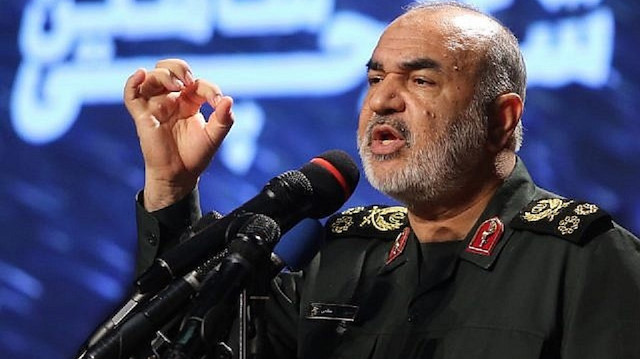

Major General Hossein Salami
SIZING UP TRUMP
The Revolutionary Guards and other branches of the Iranian military all ultimately report to Khamenei. The supreme leader has been defiant in response to Trump’s abandonment last year of the Joint Comprehensive Plan of Action, commonly called the Iran nuclear deal.
That 2015 accord with five permanent members of the U.S. Security Council – the United States, Russia, France, China and the United Kingdom – as well as Germany, removed billions of dollars’ worth of sanctions on Iran in exchange for Tehran’s curbing its nuclear program.
Trump’s demand for a better deal has seen Iran launch a two-pronged strategy to win relief from sweeping sanctions reimposed by the United States, penalties that have crippled its oil exports and all but shut it out of the international banking system.
Iranian President Hassan Rouhani has signaled a willingness to meet with American officials on condition that all sanctions be lifted. Simultaneously, Iran is flaunting its military and technical prowess.
In recent months, Iran has shot down a U.S. surveillance drone and seized a British oil tanker in the Strait of Hormuz, the narrow channel through which about a fifth of the world's oil moves. And it has announced it has amassed stockpiles of enriched uranium in violation of the U.N agreement, part of its vow to restart its nuclear program.
The Aramco attacks were an escalation that came as Trump had been pursuing his long-stated goal of extricating American forces from the Middle East. Just days after announcing an abrupt pullout of U.S. troops in northern Syria, the Trump administration on Oct. 11 said it would send fighter jets, missile-defense weaponry and 2,800 more troops to Saudi Arabia to bolster the kingdom’s defenses.
"Do not strike another sovereign state, do not threaten American interests, American forces, or we will respond," U.S. Defense Secretary Mark Esper warned Tehran during a press briefing.
Still, Iran appears to have calculated that the Trump administration would not risk an all-out assault that could destabilize the region in the service of protecting Saudi oil, said Ali Vaez, director of the Iran Project at the International Crisis Group, a nonprofit working to end global conflict.
In Iran, “hard-liners have come to believe that Trump is a Twitter tiger,” Vaez said. “As such there is little diplomatic or military cost associated with pushing back.”
The senior Trump administration official disputed the suggestion that Iran’s operation has strengthened its hand in working out a deal for sanctions relief from the United States.
“Iran knows exactly what it needs to do to see sanctions lifted,” the official said.
The administration has said Iran must end support for terrorist groups in the Middle East and submit to tougher terms that would permanently snuff its nuclear ambitions. Iran has said it has no ties to terrorist groups.
Whether Tehran accedes to U.S. demands remains to be seen.
In one of the final meetings held ahead of the Saudi oil attack, another Revolutionary Guards commander was already looking ahead, according to the official close to Iran’s decision making who was briefed on that gathering.
"Rest assured Allah almighty will be with us,” the commander told senior security officials. “Start planning for the next one."
#Iran
#Israel
#Saudi Arabia

